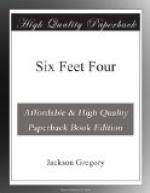Since then Thornton had seen little of Clayton. He had known even at the time of the shooting that the man was as hard a character as his close-set, little eyes and weasel face bespoke him; he had come to know him as an insatiate gambler, the pitiful sort of gambler who is too much of a drunkard to be more than his opponent’s dupe at cards. He had found him to be a brawler and very much of a ruffian. But though he did not close his eyes to these things they did not matter to him. For gratitude and a sense of loyalty were two of the strong silver threads that went to make up the mesh of Buck Thornton’s nature, and it was enough to him that little Jimmie Clayton had played the part of friend in a town where friends were scarce and at a time when but for a friend he would have died.
It was not alone the fact of Clayton’s turning up here and now that surprised the cattle man; it was the fact of his turning up anywhere. For he had thought that Clayton, weak natured and so very often the other man’s tool, was serving time in the Texas penitentiary. For, three years ago, rumour had brought to him word of a sheriff’s clean-up, and the names of three men who had been working a crude confidence game, bold rather than shrewd, and Jimmie Clayton’s name was one of the three. He had heard only after the men had been convicted and sentenced for five years apiece, and had at the time regretted that he could not have known sooner so that in some way he might have returned the favour he had never forgotten.
At last having dressed, he shoved the letter into his pocket, and went down to the bunk house for breakfast. To the cook and to the three men already at the table he had little to say, so full were his thoughts of Jimmie Clayton. He was wondering what “hard luck” the little fellow had run up against, why he was hiding out at a place like the Poison Hole shack, how he had gotten the letter to the range cabin, and, if he had brought it himself, why he had not made himself known last night.
He gave his few, succinct orders for the day, made his hurried meal, and went to the corral for his horse. And all that day he rode hard out in the broken country where the eastern end of the range ran up and back into the gorges of the mountains, shifting herd, collecting stragglers, bringing them down into the meadow lands where the feed was abundant now that he had sold the cattle he had had ranging there in order that he might raise the money to make up the five thousand dollars for Henry Pollard.
As he rode he spoke seldom to the horse running under him or to the boys with whom he worked, his thoughts flying now to another horse, lamed from a knife cut, now to a girl whose spur rowel he carried in his vest pocket, now to a man whose appealing letter he carried in another pocket. And he was glad when the day was done and the boys raced away through the dusk to their supper.
Not infrequently did he ride on after he had told the others to “knock off,” working himself harder than he could ask them to work, riding late to look at the water holes or find a new pasture in some of the little mountain valleys or to bring in a fresh string of saddle horses for the morrow’s riding. So now, as darkness gathered, he watched the boys scamper away to their food and smoke and bunks, and rode on slowly toward the north.




